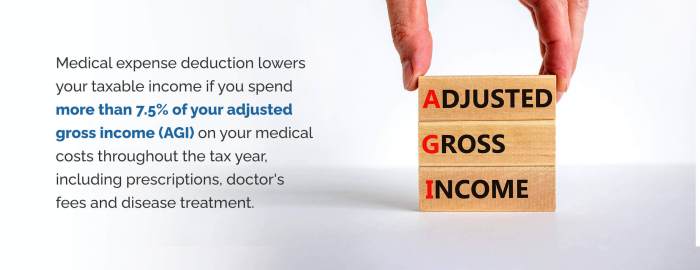Navigating the complexities of tax deductions can be daunting, especially when it comes to healthcare expenses. Understanding whether you can claim medical insurance premiums on your taxes is crucial for maximizing your tax refund or minimizing your tax liability. This guide provides a clear and concise overview of the rules and regulations surrounding the deductibility of medical insurance premiums, covering various scenarios and providing practical examples to assist you in accurately claiming your deductions.
We’ll explore the eligibility criteria for deducting premiums, differentiating between employees and self-employed individuals. We’ll also delve into the specifics of different premium types, the role of Health Savings Accounts (HSAs), essential documentation, and the proper procedures for filing your taxes. By the end, you’ll have a firm grasp of how to navigate this aspect of tax preparation confidently.
Eligibility for Deduction
Determining whether you can deduct medical insurance premiums on your taxes hinges on several factors, primarily your employment status and the type of insurance plan. The rules differ significantly between employees and self-employed individuals. Understanding these distinctions is crucial for accurate tax filing.
Eligibility for deducting medical insurance premiums depends on whether you are an employee or self-employed. Employees generally cannot deduct premiums paid for employer-sponsored health insurance, while self-employed individuals may be able to deduct a portion of their premiums. The type of health insurance plan also plays a role.
Deduction Criteria for Self-Employed Individuals
Self-employed individuals can deduct the amount they paid for health insurance premiums as an above-the-line deduction. This means the deduction is taken before calculating adjusted gross income (AGI). To qualify, the premiums must be for health insurance covering the taxpayer, their spouse, and their dependents. The taxpayer must also be self-employed or have income from a business or profession. Importantly, the self-employed individual cannot be eligible to participate in an employer-sponsored health plan.
Examples of Qualifying Medical Insurance Plans
Qualifying health insurance plans include plans purchased through the Health Insurance Marketplace (often referred to as Obamacare), plans purchased directly from an insurance company, and plans offered through professional organizations or associations. These plans typically cover medical expenses such as doctor visits, hospital stays, and prescription drugs. Medicare premiums are generally not deductible unless they are part of a self-employment deduction.
Deduction Rules: Employees vs. Self-Employed
The key difference lies in the availability of the deduction. Employees typically cannot deduct premiums paid for employer-sponsored health insurance because the cost is often considered part of their compensation package. However, self-employed individuals can deduct their health insurance premiums as a business expense. This is a significant tax advantage for self-employed individuals, as it reduces their taxable income.
Situations Where Premiums Are Not Deductible
Premiums are not deductible if the taxpayer is eligible to participate in an employer-sponsored health plan, even if they choose not to enroll. Additionally, premiums paid for long-term care insurance or supplemental health insurance (like dental or vision) are typically not deductible as medical expenses unless other criteria are met. Premiums paid for a plan that does not meet minimum federal requirements for health coverage may also not be deductible. It’s crucial to verify your plan’s eligibility.
Types of Medical Insurance Premiums
Understanding the different types of medical insurance premiums and their deductibility is crucial for accurately completing your tax return. This section clarifies which premiums qualify for tax deductions and provides examples to illustrate the complexities involved. Remember, specific rules and regulations may vary depending on your location and the tax year. Always consult with a tax professional for personalized advice.
Deductibility of Premiums for Self-Employed Individuals
Self-employed individuals can often deduct the premiums they pay for health insurance. This is a significant tax advantage, as it allows them to reduce their taxable income. To claim this deduction, you must itemize your deductions rather than using the standard deduction. The amount you can deduct is the actual amount you paid in premiums during the tax year for yourself, your spouse, and your dependents, provided they are not eligible to receive employer-sponsored health coverage.
Deductibility of Premiums for Spouses and Dependents
Premiums paid for a spouse or dependents are generally deductible under the same conditions as premiums paid for oneself. The key factor is that the individual covered by the insurance policy must not be eligible for employer-sponsored health insurance. If your spouse or dependent is covered by their employer’s health insurance plan, you cannot deduct the premiums you paid for them. This rule helps prevent double-dipping of tax benefits.
Premiums Paid Through a Health Savings Account (HSA)
Contributions to a Health Savings Account (HSA) are tax-deductible, and the money within the HSA can be used to pay for qualified medical expenses, including health insurance premiums. However, the deduction for HSA contributions is separate from the deduction for medical insurance premiums themselves. You cannot deduct the same amount twice. You would claim the HSA deduction separately and then use HSA funds to pay premiums. The premiums paid from the HSA are not themselves deductible.
Comparison of Premium Types and Deductibility
| Premium Type | Deductible? | Conditions | Example |
|---|---|---|---|
| Self-Employed Individual Premiums | Yes | Must itemize deductions; individual and dependents must not be eligible for employer-sponsored coverage. | A freelancer pays $5,000 annually for their health insurance. They can deduct this amount if they itemize. |
| Spouse’s Premiums | Yes | Spouse must not be eligible for employer-sponsored coverage; taxpayer must itemize deductions. | A taxpayer pays $3,000 annually for their spouse’s health insurance; the spouse has no employer-sponsored coverage. The taxpayer can deduct this amount if itemizing. |
| Dependent’s Premiums | Yes | Dependent must not be eligible for employer-sponsored coverage; taxpayer must itemize deductions. | A taxpayer pays $2,000 annually for their child’s health insurance; the child has no employer-sponsored coverage. The taxpayer can deduct this amount if itemizing. |
| Premiums Paid from HSA | No (Premiums themselves are not deductible) | HSA contributions are deductible; funds from the HSA can be used to pay premiums. | A taxpayer contributes $3,500 to their HSA and uses those funds to pay their health insurance premiums. The $3,500 contribution is deductible, but the premiums paid are not separately deductible. |
Documentation and Record Keeping

Meticulous record-keeping is crucial when claiming medical insurance premiums as a tax deduction. The IRS requires substantial proof to substantiate your claim, preventing potential audits and ensuring a smooth tax filing process. Failing to maintain adequate records can result in the rejection of your deduction claim, leading to additional tax liability and potential penalties.
Proper documentation and organization are essential for a successful deduction claim. This involves not only collecting the necessary documents but also implementing a system to store and retrieve them efficiently. A well-maintained system minimizes stress during tax season and simplifies the process significantly.
Necessary Documents for Deduction Support
To support your claim, gather all relevant documentation related to your medical insurance premiums. This comprehensive approach ensures you have all the necessary evidence to justify your deduction.
- Form 1095-A: This form, provided by your insurance marketplace, details your health insurance coverage for the tax year.
- Premium Payment Records: This includes bank statements, canceled checks, payment confirmations from your insurance provider, or receipts showing premium payments made throughout the year.
- Tax Return: Your completed tax return, including Schedule 1 (Additional Income and Adjustments to Income), where you’ll claim the deduction.
Methods for Organizing and Storing Documents
Organizing your tax documents effectively ensures easy access and minimizes the risk of losing crucial information. Consider implementing a digital or physical filing system that suits your needs and preferences.
- Digital Filing: Scan and store all documents in a clearly labeled digital folder. Use cloud storage services for secure backup and easy access from multiple devices.
- Physical Filing: Use a labeled file folder or binder to store physical copies of your documents. Organize them chronologically or by type of document for easy retrieval.
- Hybrid Approach: Combine digital and physical filing. Keep digital copies for easy access and maintain physical copies as a backup.
Sample Record-Keeping System for Tracking Premium Payments
A well-structured record-keeping system simplifies tracking premium payments and ensures accuracy during tax preparation. This sample system demonstrates a practical approach to maintaining accurate records.
| Date | Payment Amount | Payment Method | Description (e.g., Insurance Company, Policy Number) | Supporting Document (File Name or Location) |
|---|---|---|---|---|
| January 15, 2024 | $500 | Checking Account | Acme Health Insurance, Policy #12345 | Bank Statement January 2024 |
| February 14, 2024 | $500 | Credit Card | Acme Health Insurance, Policy #12345 | Credit Card Statement February 2024 |
Consequences of Inadequate Record-Keeping
Insufficient documentation can have significant consequences for your tax return. The IRS may reject your deduction claim if they lack sufficient evidence to verify your expenses.
- Rejection of Deduction: Your claim for the medical insurance premium deduction may be denied, resulting in a higher tax liability.
- Increased Tax Liability: You will owe additional taxes, plus any applicable interest and penalties.
- IRS Audit: The IRS might initiate an audit to investigate the accuracy of your tax return, leading to a time-consuming and stressful process.
Impact of Health Savings Accounts (HSAs)

Health Savings Accounts (HSAs) offer a powerful tool for managing healthcare costs and reducing your tax burden. By combining pre-tax contributions with tax-advantaged growth and tax-free withdrawals for qualified medical expenses, HSAs can significantly impact the deductibility of your medical insurance premiums and overall tax liability. Understanding how HSAs interact with premium payments is crucial for maximizing their benefits.
HSAs and Premium Deductibility: Contributions to an HSA do not directly affect the deductibility of your medical insurance premiums. The deductibility of premiums depends on whether you itemize deductions on your tax return and whether your premiums meet the criteria for medical expense deductions (generally exceeding 7.5% of your adjusted gross income (AGI)). However, HSAs indirectly impact deductibility by lowering your taxable income. Because HSA contributions are made pre-tax, your taxable income is reduced, potentially pushing your medical expenses above the 7.5% AGI threshold, making more of your premiums deductible if you itemize.
Tax Advantages of HSAs Compared to Other Payment Methods
Using an HSA offers significant tax advantages compared to paying premiums directly from post-tax income. With direct payment, the entire premium amount is considered taxable income. In contrast, HSA contributions are tax-deductible, meaning the money contributed is not subject to income tax. Furthermore, the money grows tax-deferred within the HSA, and withdrawals for qualified medical expenses are tax-free. This triple tax advantage makes HSAs a superior strategy for long-term healthcare cost management compared to using after-tax dollars or flexible spending accounts (FSAs), which offer less favorable tax treatment.
Examples of HSA Contributions Reducing Taxable Income
Let’s illustrate how HSA contributions reduce taxable income. Suppose an individual has an annual adjusted gross income (AGI) of $60,000 and contributes $3,500 to their HSA. Their taxable income is reduced by $3,500. This reduction can affect their tax bracket and lead to significant tax savings. For instance, if they were in the 22% tax bracket, the tax savings would be $770 ($3,500 x 0.22). If they also had $5,000 in medical expenses, the reduced AGI might allow them to deduct a larger portion or all of their medical expenses.
Calculating Deductible Amount with HSA
The calculation of the deductible amount when using an HSA involves two steps. First, determine your adjusted gross income (AGI) after deducting HSA contributions. Second, calculate 7.5% of this adjusted AGI. Only medical expenses exceeding this 7.5% threshold are deductible.
Example: An individual has an AGI of $70,000 before HSA contributions. They contribute $3,000 to their HSA, reducing their AGI to $67,000. 7.5% of $67,000 is $5,025. If their total medical expenses for the year, including premiums, are $6,000, they can deduct $975 ($6,000 – $5,025). This deductible amount can be claimed when itemizing deductions on their tax return.
Ultimate Conclusion

Claiming medical insurance premiums on your taxes can significantly impact your overall tax burden. Understanding the eligibility requirements, documentation needs, and proper filing procedures is key to maximizing your tax benefits. While the specifics can vary based on individual circumstances and employment status, this guide has provided a comprehensive framework for navigating this process. Remember to maintain meticulous records and consult with a tax professional if you have any specific questions or require personalized guidance. Accurate record-keeping and a thorough understanding of the relevant tax laws will ensure a smooth and successful tax filing experience.
Questions Often Asked
Can I deduct premiums for my spouse and children?
Yes, under certain conditions. Deductibility depends on factors such as whether they are claimed as dependents and the type of coverage.
What if I paid my premiums through a Flexible Spending Account (FSA)?
Premiums paid through an FSA are generally not deductible because the contributions are pre-tax.
What happens if I make a mistake on my tax return regarding medical insurance deductions?
You may be required to file an amended return. Penalties may apply depending on the nature and extent of the error.
Where can I find the specific tax forms needed to claim this deduction?
The specific form will depend on your filing status and situation. Consult the IRS website or a tax professional for guidance.
Are there any limitations on the amount of premiums I can deduct?
Yes, there are often limitations, particularly for self-employed individuals. Consult the IRS guidelines for the current year’s limits.